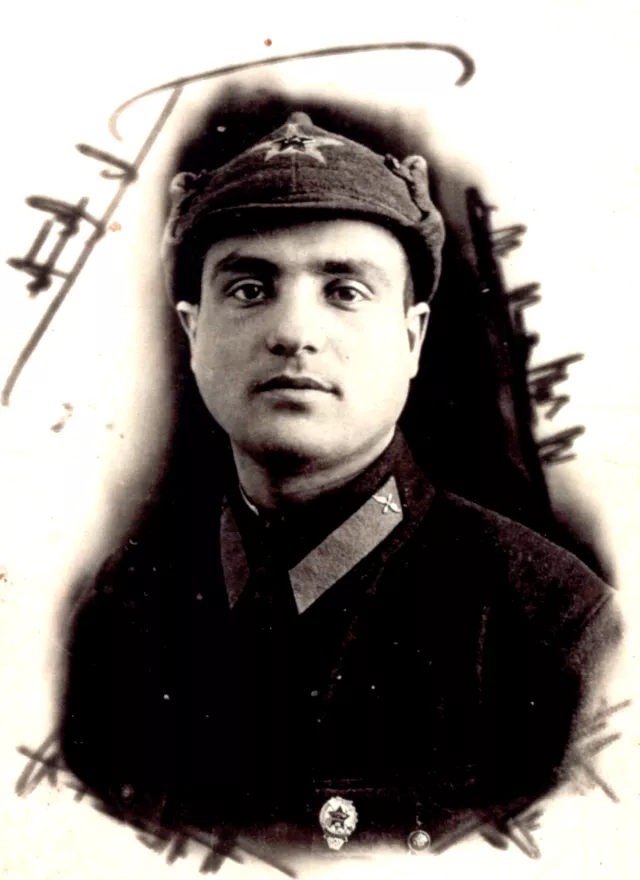Israel Gliazer
This is me, Israel Gliazer, during my studies at Communications School, wearing a uniform of a Red army soldier at the beginning of World War II. This photo was taken in Irkutsk, January 1941.
The Soviet power came to Pogdaytsy in 1939. I worked in the nationalized printing house. It formerly belonged to Mainlis, a wealthy Jewish widow. In early 1940 I was recruited to the Soviet army. Since I had a lower secondary education my commandment sent me to the communications school for junior commandment at an air force division in Primorskiy region in the Far East in 7000 km from home. At the beginning I was having a hard time since I didn't know Russian. Officers and soldiers had a friendly attitude and helped me a lot. I studied the language and technical subjects simultaneously. My commandment wanted to send me to an officer's school, but changed his mind due to my poor Russian. In May 1941 after finishing my school I was assigned to service in the military aerodrome in Primorye, near where our school was. It turned out to be better for me since when the Great Patriotic War began I was far from home. We heard about the war in the evening of 22 June 1941 after dinner. We usually marched to our barrack singing march songs, but this time our officers didn't give us an order to sing. It seemed strange to us. We were told to get together in the conference hall where we heard about perfidious attack of Germany. This was 12 o'clock Moscow time. [Editor's note: the time difference between Moscow and the Far East is 9 hours.]
Radio operators didn’t get sufficient training. We needed better training provisions to improve communications and there was a special school of radio operators organized. I was selected to work as a training instructor in this school. I don’t know the exact location of this school. It took us less than 24 hours to drive there. I trained radio operators in this school until late 1942. Every 4 months we sent another group of newly trained radio operators to the front.
In late 1942 I was assigned to be chief of radio station in an aerodrome in the rear of the 4th Ukrainian Front. Our unit was based near Kherson and Nikolaev in the south of Ukraine. We were following our troops advancing to the west. We lodged in barracks or dugout huts in the woods. We got along well and supported each other. We got sufficient food especially that every day our fellow comrades perished and we shared their food. Every day we received 100 grams of alcohol and we drank them in commemoration of those that perished. My fellow comrades were of different nationalities. We got along very well. Nobody cared about nationality issues. People were valued for their human merits.
I joined Komsomol in the army and prepared my application to the Party for submittal. However, they didn’t admit my application since I was an ‘untrustworthy element’ from the point of view of my commandment. It was a standard attitude to residents of the areas that were recently annexed to the USSR. Several times my fellow comrades submitted requests for my promotion, but again they refused for this same reason.
At the end of the war in spring 1945 our regiment was relocated to the vicinity of Vladivostok in the Far East. When military action against Japan began our unit within the structure of a division was relocated to the Korean port of Chongjin. A Japanese military school and two divisions were in defense of the town. Shortly after we occupied the port Japan capitulated. I was assigned to headquarters of 25th army in Pyongyang. I issued an army newspaper Krasnoye Znamia (Red banner) there. They were trying to convince me to take up a military career, but I refused.













